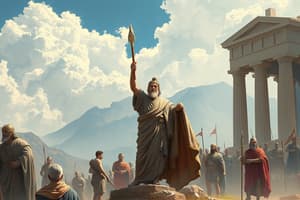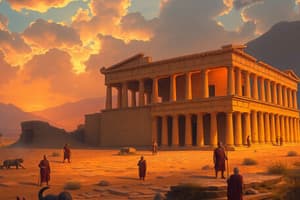Podcast
Questions and Answers
Which sophist is mentioned as questioning the established order alongside Thrasymachus?
Which sophist is mentioned as questioning the established order alongside Thrasymachus?
- Socrates
- Xerxes
- Plato
- Callicles (correct)
Callicles believes that laws are created to benefit the stronger individuals.
Callicles believes that laws are created to benefit the stronger individuals.
True (A)
What does Callicles think about seeking more than others?
What does Callicles think about seeking more than others?
He believes it is just to seek more than others.
Callicles suggests that the __________ should bear rule over the weaker.
Callicles suggests that the __________ should bear rule over the weaker.
Match the following sophists with their viewpoints:
Match the following sophists with their viewpoints:
What is Callicles' view of conventional justice?
What is Callicles' view of conventional justice?
According to Callicles, nature shows that equality among individuals is just.
According to Callicles, nature shows that equality among individuals is just.
In which historical context does Callicles refer to Xerxes?
In which historical context does Callicles refer to Xerxes?
What did Thrasymachus argue about legal discourse?
What did Thrasymachus argue about legal discourse?
Socrates believed that injustice leads to harmony among men.
Socrates believed that injustice leads to harmony among men.
What does Socrates conclude about the relationship between injustice and happiness?
What does Socrates conclude about the relationship between injustice and happiness?
For Socrates, the soul cannot fulfill its function if it is deprived of its own __________.
For Socrates, the soul cannot fulfill its function if it is deprived of its own __________.
Match the following concepts with their descriptions:
Match the following concepts with their descriptions:
What does Socrates argue about a band of criminals regarding justice?
What does Socrates argue about a band of criminals regarding justice?
Thrasymachus ultimately recognizes justice as a virtue.
Thrasymachus ultimately recognizes justice as a virtue.
According to Socrates, what effect does injustice have on a single individual?
According to Socrates, what effect does injustice have on a single individual?
What was one of the main teachings of the sophists?
What was one of the main teachings of the sophists?
The sophists believed that law and justice were universal and unchanging.
The sophists believed that law and justice were universal and unchanging.
What did Protagoras assert about truth and justice?
What did Protagoras assert about truth and justice?
The period after Pericles' reign is often described as the beginning of the __________ of the Athenian Golden Age.
The period after Pericles' reign is often described as the beginning of the __________ of the Athenian Golden Age.
Match the sophist with their belief:
Match the sophist with their belief:
Who was sentenced to death during the decline of Athenian democracy?
Who was sentenced to death during the decline of Athenian democracy?
According to the sophists, conventions created by humans play a major role in defining justice.
According to the sophists, conventions created by humans play a major role in defining justice.
Name the regime that replaced democracy in Athens in 404 BC.
Name the regime that replaced democracy in Athens in 404 BC.
Flashcards are hidden until you start studying
Study Notes
Historical Context of Athens
- Pericles' reign marked the peak of the Athenian Golden Age, ending with his death.
- The Peloponnesian War resulted in Athens' defeat by Sparta in 404 BC.
- Following the war, the political landscape shifted significantly, leading to a tyranny known as the regime of the 'Thirty'.
- Socrates was sentenced to death during a time characterized by widespread tyranny, described by Cicero as having more tyrants than bodyguards.
Sophists and Their Theories
- Sophists gained popularity due to the political and social disillusionment following the war.
- They traveled and taught rhetoric in various Greek cities, sometimes accused of cynicism and amoralism.
- Distinguished between natural law (phusis) and law of convention (nomos), sparking debate among early thinkers on natural law.
- Advocated the idea that law and justice are relative and based on societal norms rather than universal truths.
Key Figures and Philosophies
- Protagoras posited that truth and justice are subjective, depending on individual perception and civic convention.
- Antiphon suggested that justice consists in adherence to societal rules, highlighting the distinction between established legal norms and natural laws.
- Thrasymachus argued that conventional legal systems serve the interests of the powerful, rather than reflecting an objective sense of justice.
Socratic Rebuttal
- Socrates countered Thrasymachus' views by asserting that true justice is a virtue, which fosters social harmony and personal well-being.
- He argued that injustice leads to internal discord, hindering the ability of individuals to act with integrity.
- Through dialogue, Socrates convinced Thrasymachus that injustice ultimately brings unhappiness, while justice leads to a well-lived life.
Philosophical Developments Post-Sophists
- Socratic dialogues laid the groundwork for later philosophical thought by Plato and Aristotle, focusing on the relationship between reason (logos) and law (nomos).
- Plato criticized more radical sophists like Callicles, who claimed that laws serve the interests of the weaker majority, thereby stifling the naturally stronger individuals.
- Callicles argued that natural justice supports the idea that the superior should dominate the inferior, challenging conventional moral perspectives.
Implications of Sophist Thought
- Sophist theories initiated critical discussions about the nature of justice and the role of law in society, leading to enduring philosophical debates.
- Their relativistic views questioned established norms and prompted a search for a rational basis for justice, laying foundations for future legal and ethical theories.
Conclusion
- The tension between Sophistic relativism and Socratic idealism marked a significant philosophical divide in ancient Greek thought.
- The legacies of these discussions continue to influence contemporary debates about justice, authority, and the nature of truth.
Studying That Suits You
Use AI to generate personalized quizzes and flashcards to suit your learning preferences.




